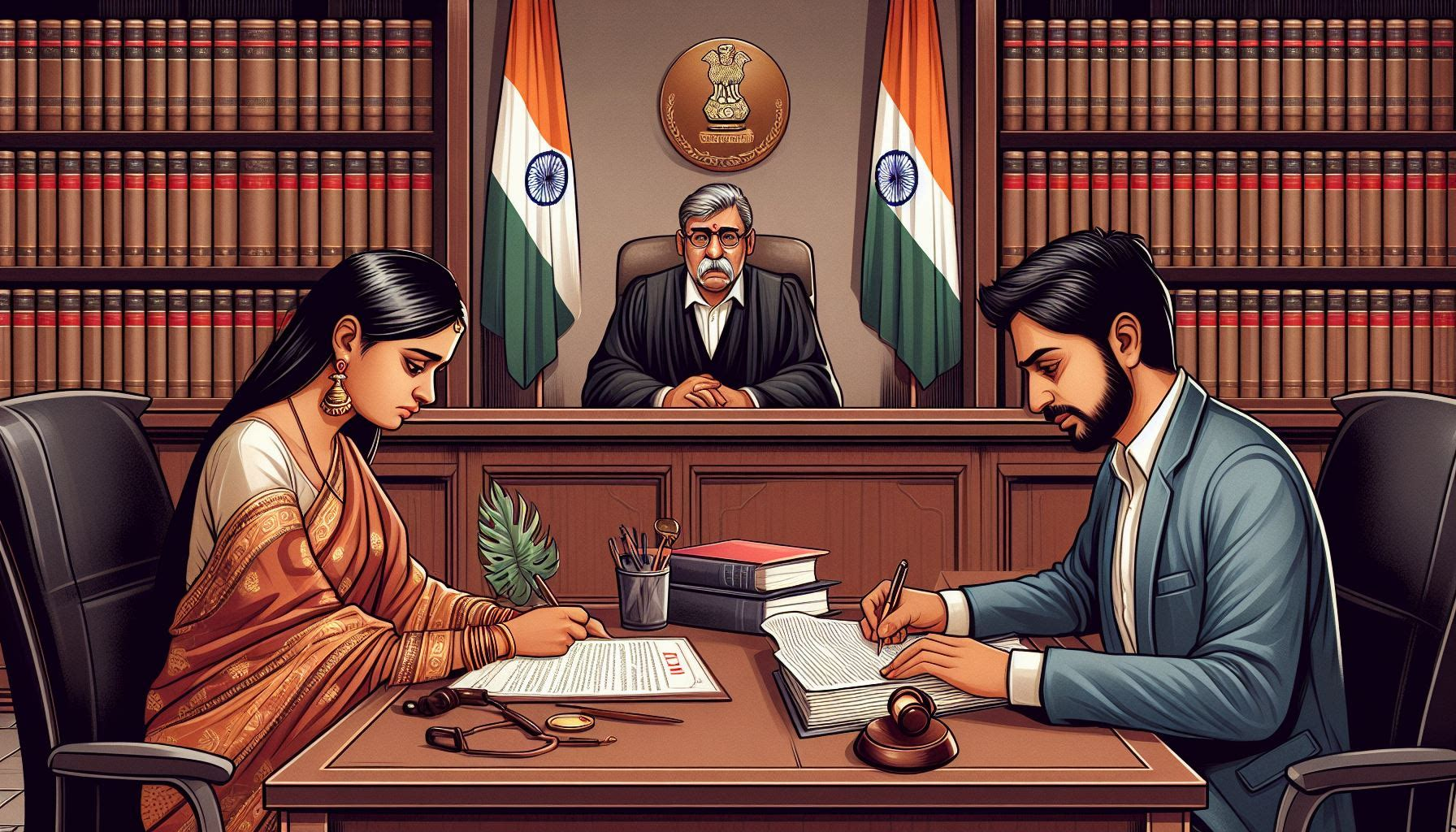When a Wife is Entitled to Get Maintenance from Her Husband in India
Maintenance is a crucial aspect of family law in India, providing financial support to a wife to ensure her well-being and dignity after separation or divorce. The entitlement to maintenance is governed by various laws and statutes, ensuring that women have the necessary financial support to maintain themselves. This blog delves into the legal provisions, procedures, and required documents related to the maintenance of a wife by her husband in India.
Legal Provisions for Maintenance in India
In India, maintenance for a wife is governed by several legal statutes, including:
- Hindu Marriage Act, 1955
- Hindu Adoption and Maintenance Act, 1956
- Code of Criminal Procedure, 1973 (Section 125)
- Protection of Women from Domestic Violence Act, 2005
- Special Marriage Act, 1954
- Muslim Women (Protection of Rights on Divorce) Act, 1986
Each of these acts has specific provisions regarding the circumstances under which a wife can claim maintenance and the procedure to be followed.
Maintenance Under Hindu Marriage Act, 1955
Legal Provisions
- Section 24: Provides for maintenance pendente lite (temporary maintenance during the pendency of legal proceedings) and legal expenses for the wife.
- Section 25 : Allows for permanent alimony and maintenance, either as a lump sum or periodic payments, after the divorce.
Conditions for Claiming Maintenance
– The wife must not have sufficient independent income to support herself.
– The husband’s income and ability to pay are considered.
– The duration and standard of living during the marriage are taken into account.
Procedure
- Filing a Petition: The wife must file a petition for maintenance in the family court.
- Submission of Evidence: Both parties must submit evidence regarding their income, expenses, and standard of living.
- Court Hearing: The court hears both parties and evaluates the evidence.
- Court Order: The court issues an order specifying the amount of maintenance to be paid.
Required Documents
– Marriage Certificate: Proof of marriage.
– Income Proof: Salary slips, bank statements, tax returns.
– Expense Details: Monthly expenses, bills, and other financial obligations.
– Proof of Husband’s Income: Salary slips, bank statements, tax returns of the husband.
Maintenance Under Hindu Adoption and Maintenance Act, 1956
Legal Provisions
– Section 18: Provides for maintenance of a wife during her lifetime.
Conditions for Claiming Maintenance
– The husband has deserted or willfully neglected the wife.
– The husband has treated the wife with cruelty.
– The husband has another wife living.
– The husband has converted to another religion.
– Any other justifiable cause.
Procedure and Required Documents
Similar to the procedure under the Hindu Marriage Act, a petition must be filed in the family court, and similar documents are required.
Maintenance Under Code of Criminal Procedure, 1973 (Section 125)
Legal Provisions
– Section 125: Provides for maintenance to the wife, children, and parents irrespective of their religion.
Conditions for Claiming Maintenance
– The wife must be unable to maintain herself.
– The husband must have sufficient means but neglects or refuses to maintain his wife.
Procedure
- Filing an Application : The wife must file an application in the magistrate’s court.
- Submission of Evidence : Both parties present evidence regarding their financial status.
- Court Hearing : The court hears the arguments and reviews the evidence.
- Court Order : The court passes an order for maintenance, specifying the amount to be paid.
Required Documents
– Marriage Certificate: Proof of marriage.
– Income Proof: Salary slips, bank statements, tax returns.
– Expense Details: Monthly expenses, bills, and other financial obligations.
– Proof of Husband’s Income: Salary slips, bank statements, tax returns of the husband.
Maintenance Under Protection of Women from Domestic Violence Act, 2005
Legal Provisions
– Section 20: Provides for monetary relief to the wife, including maintenance.
Conditions for Claiming Maintenance
– The wife must be a victim of domestic violence.
– The maintenance is in addition to other reliefs under the act.
Procedure
- Filing a Domestic Violence Complaint : The wife must file a complaint under the act.
- Application for Relief : The wife can simultaneously apply for maintenance.
- Court Hearing : The court hears the case and reviews the evidence.
- Court Order : The court issues an order specifying the reliefs, including maintenance.
Required Documents
– Domestic Violence Complaint: Detailed complaint outlining incidents of domestic violence.
– Marriage Certificate: Proof of marriage.
– Income Proof : Salary slips, bank statements, tax returns.
– Expense Details : Monthly expenses, bills, and other financial obligations.
– Proof of Husband’s Income : Salary slips, bank statements, tax returns of the husband.
Maintenance Under Special Marriage Act, 1954
Legal Provisions
– Section 36: Provides for maintenance pendente lite.
– Section 37 : Provides for permanent alimony and maintenance after divorce.
Conditions for Claiming Maintenance
– Similar to the conditions under the Hindu Marriage Act, 1955.
Procedure and Required Documents
The procedure and documents required are similar to those under the Hindu Marriage Act, 1955.
Maintenance Under Muslim Women (Protection of Rights on Divorce) Act, 1986
Legal Provisions
– Section 3: Provides for reasonable and fair provision and maintenance to be made by the husband within the Iddat period (waiting period after divorce).
Conditions for Claiming Maintenance
– The wife must be divorced by her husband.
– Maintenance is provided for the Iddat period and for the children born to the divorced wife.
Procedure
- Filing an Application : The divorced wife must file an application in the family court.
- Submission of Evidence : Both parties present evidence regarding their financial status.
- Court Hearing : The court hears the case and reviews the evidence.
- Court Order : The court issues an order for maintenance.
Required Documents
– Divorce Proof : Proof of divorce.
– Marriage Certificate : Proof of marriage (Nikahnama).
– Income Proof : Salary slips, bank statements, tax returns.
– Expense Details : Monthly expenses, bills, and other financial obligations.
– Proof of Husband’s Income : Salary slips, bank statements, tax returns of the husband.
Common Considerations Across All Acts
Factors Affecting Maintenance
– Financial Status : The income and financial status of both parties.
– Standard of Living : The standard of living enjoyed by the wife during the marriage.
– Health and Age : The health and age of the wife.
– Custody of Children : If the wife has custody of the children, additional maintenance may be granted.
Enforcement of Maintenance Orders
– Court Orders : Maintenance orders are legally binding, and non-compliance can lead to legal consequences.
– Execution Petition : The wife can file an execution petition in the court if the husband fails to comply with the maintenance order.
– Attachment of Property : The court can order the attachment of the husband’s property for recovery of maintenance.
Conclusion
In India, the legal framework for maintenance ensures that wives have the necessary financial support to lead a dignified life post-separation or divorce. The provisions under the Hindu Marriage Act, Hindu Adoption and Maintenance Act, Code of Criminal Procedure, Protection of Women from Domestic Violence Act, Special Marriage Act, and Muslim Women (Protection of Rights on Divorce) Act provide a comprehensive mechanism for claiming maintenance. Understanding the legal procedures and required documents is crucial for effectively navigating the process and securing rightful maintenance. By following the outlined steps and ensuring all necessary documents are in order, wives can achieve a fair and just maintenance order.


